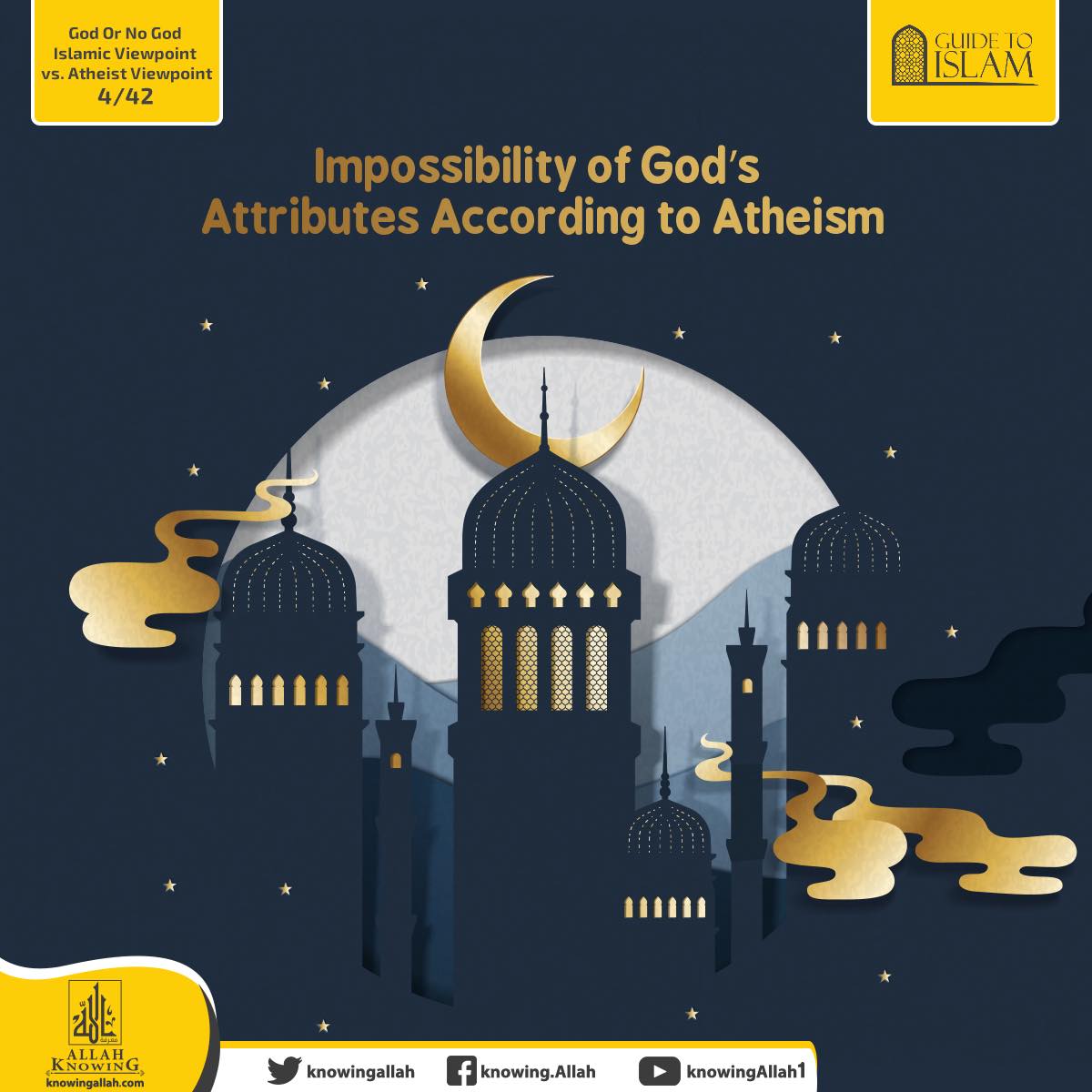Impossibility Of God’s Attributes

Having faith in the unseen and the unknown is what faith is all about. God is an entity absolutely distinct from and sovereign over all of creation, both living and non-living. He is essentially above and beyond nature and its laws of physics. He is the One Who created them from nothing. He is the cause behind their functioning and continuation, and He is the One Who controls and manages them alone, without a partner or a helper. He is above and beyond any comparison that the human mind can make. It would be impossible for the human mind, which is limited by the constraints of time, space, and ability, to attain any knowledge of God’s Being and Essence (and basically this is something not required of humans at all). Therefore, God, His Essence, and His Attributes are, in principle, inaccessible to direct human observation and scientific investigation.
• Atheism is grounded in the physical and observable world. Physical reality is the extent of reality. Only that which can be perceived by human senses and explained scientifically is real. Anything short of this is unreal. There can be no levels of reality higher than human thought or greater dimensions beyond the limits of the material world.
• Atheism attributes the creation of humans and the order of the universe to nature and chance rather than to a Creator God. Humans are nature’s peak products and most complex handiwork. As nothing can exist beyond the natural world and its laws, nothing in existence is higher than humans.
• Atheism argues that if God is beyond nature – supernatural – and His attributes are transcendent, He remains forever undetectable and unverifiable by humans. If something exists, it must be natural and must have a visible presence, supported by measurable, observable, and repeatable empirical evidence (data). Otherwise, it does not exist.
• What makes the notion of God even more improbable for atheists are God’s attributes. They argue that since everything of which humans are aware has limits, God’s infinite attributes, which express His eternal and infinite essence, would be forever beyond human limits.
• Or they believe that attributes would impose limits and limits would restrict the capacities of a supreme being. Or they see the attributes employed to define God’s Nature as self-contradictory, inconsistent in themselves, or yield inconsistencies when combined with His other qualities.
A question of Logic
A simple Bedouin was asked: How do you know your Lord exists?
He replied: Footprints indicate the existence of walkers. Camel’s dung indicates the existence of camels. A sky filled with constellations (patterns of stars); an earth provided with wide paths; and seas filled with waves – do they not all point to the existence of the One Who is Hearer and Seer of all?
Qur'anic Insights
One Qur’anic verse gives a powerful argument to convince humans that they must have a Creator Who created them:
“Were they (humans) created by nothing or were they themselves the creators?
(Qur’an 52:35)
And brought this entire universe into existence:
“Or did they create the heavens and the earth? Rather, they have no certain knowledge.”
(Qur’an 52:36)
It is a fact that something does not come from nothing. Since something exists, and since nothing can create itself, a creator is necessary to explain it.
Logically, humans exist, and the heavens and earth also exist. Humans neither created themselves, nor did they create the heavens and earth or the laws and phenomena of nature. They all must have a Creator – a Creator Who is Himself Self-Subsistent and not Himself a created being.
God’s Essence
• In Islam, knowledge of God is not an area of conjecture or personal opinion. The only way to the knowledge of God is through the guidance of revelation.
• Only God can disclose information about Himself; who He is and what He is like. Humans could never discover this knowledge on their own. In the Qur'an, God describes Himself as follows:
“Vision comprehends Him not, but He comprehends all vision”
(Qur’an 6:103)
and
“Put not forward similitudes for God”
(Qur’an 16:74)
and
“There is nothing whatever like unto Him”
(Qur’an 42:11)
• God’s Essence, as stated in the Qur’an, is beyond the scope of human perception and comprehension. The human imagination cannot possibly conjure up what God is like. Imagination consists of fragments of reality already perceived; the human mind cannot imagine beyond what it sees and experiences in the physical world. The picture-making power of the mind is based on observation; God resembles or compares to nothing in this world.
• It is obvious, then, that the human mind can never know One Who is Unique, Incomparable, and dissimilar to anything in creation. Therefore, Prophet Muhammad (peace be upon him) cautioned mankind in this regard, saying, “Ponder about the creatures of God and do not ponder about God Himself (His Essence) lest you be ruined.” The human brain has cognitive, temporal, and spatial limits which it cannot possibly transcend. A sound human intellect can know God’s existence, but it cannot know God’s Essence. God is too Exalted to be encompassed by the created finite human mind.
• Such absolute knowledge of God is impossible, and there only remains for the human being the option of relative knowledge. Humans can never know God’s Essence, but they can know Him through His attributes with which He described Himself in the Qur’an and through His works in the universe. God – His Glory, Power, and Grandeur – is reflected in nature and throughout His creations, from the blades of grass to the faraway stars.

